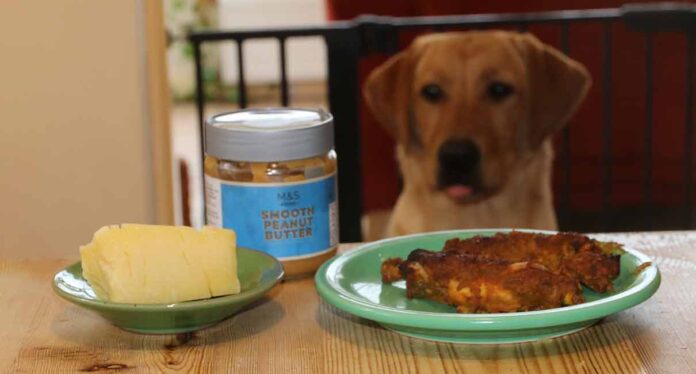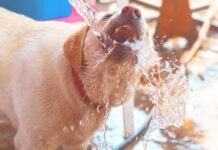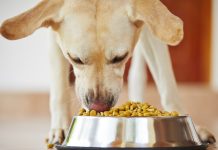Sharing is caring right? Well not always. There are plenty of human foods that are not good for dogs, and some that are positively dangerous.
The internet is awash with articles entitled: “can dogs eat (insert the food of your choice here)”. From the everyday to the bizarre it seems that we are driven to share what’s on our plate, with our best friends.
Rather than write hundreds of articles, one for every type of food that you could possibly imagine sharing with your dog, I’m going to give you a guide to the different types of foods you can share with your furry friend, the foods that you really shouldn’t share, and the foods that can make your dog very sick.
If you believe your dog has eaten a food that is poisonous to dogs, telephone your veterinarian for advice right away. If you can’t get hold of your veterinary professional contact the Pet Poison Helpline 855-764-7661 This is a 24 hour animal poison control service available throughout US, Canada and the Carribean. In the UK you need the Animal Poison Helpline 01202 509000
To Share Or Not To Share
- Foods that can harm dogs
- Foods that are unhealthy for dogs
- Foods that are safe for dogs
- How to stop your dog begging for food
Thousands of years of living alongside, and scavenging from, humans has led to dogs being able to digest a wide range of food. And as a result you’ll sometimes find dogs referred to as omnivores.
However dogs are still essentially carnivores. They are still classified as carnivores, they have the short digestive tract and teeth of a carnivore. And they thrive on a diet designed specifically for carnivorous dogs.

This could be a balanced diet of raw meats and bones. Or it could be a manufactured diet of dry or wet food manufactured and promoted, for canine consumption.
How Much Can I Share?
Feeding a dog anything that does not fall into those categories of food that is specifically appropriate for dogs, is likely to produce an imbalance in the nutrients that your dog is consuming. For the most part, the impact of inappropriate food is likely to be closely related to the quantity consumed.
So,when I talk about foods that you can safely share with your dog, it’s important that you bear this in mind, and keep the quantities small. The vast majority of the food your dog eats should be a properly balanced raw diet, or a commercially produced dog food.
If you are eating something that you’d like to share with your dog, there are some rules to consider.
Foods That Can Harm Dogs
How vulnerable a dog is to being poisoned by human food depends on the body weight of the dog and to some extent their age and state of health.
Below are some examples of very common foods that can and do kill dogs. This is not an exclusive list.
- Chocolate
- Xylitol (sweetener)
- Raisins
- Some nuts
Chocolate
You should not share chocolate with your dog. Chocolate is most dangerous if it is dark chocolate, and if the dog is quite small. The culprit in chocolate is a chemical called theobromine. Some chocolates contain more of this chemical than others. Dogs are sensitive to theobromine and it can be lethal.
If your large breed dog has eaten a chip from a chocolate chip cookie, they are probably not going to come to any harm. But if they have stolen a box of chocolates or eaten a large slab of chocolate you need to get advice from your veterinarian now. Dark chocolate is especially rich in theobromine. Smaller dogs can get sick after eating much smaller quantities so it is best to avoid chocolate altogether.
Peanut butter
Pure peanut butter with nothing added may be safe for your dog even if it does not contribute nutritionally to your dog’s wellbeing. But peanut butter is often sweetened with a chemical called Xylitol. And xylitol is poisonous to dogs.
Peanut butter is not the only human food that may be sweetened. Always check the labelling on any human food that has been processed for the presence of xylitol. It is most commonly found in chewing gum so always keep your gum well out of reach of your dog.
Raisins
Grapse, raisins, and some other dried fruits can make dogs very ill, and even cause kidney failure. It’s important to keep these foods well away from your dog.
Remember, these are just examples. You can find more information in my article: Which Foods Are Toxic To Dogs Harmful foods are often found mixed with other foods, which is another reason why it’s not a great idea to share food produced for humans, with our dogs.
Pecans and Walnuts
Pecan nuts and walnuts are poisonous to dogs. Some dogs can tolerate cashews but it’s best to avoid nuts in general when sharing food with your dog.
Foods That Are Unhealthy For Dogs
The kinds of food we often like to share with dogs are snacks and treats that we are eating away from the meal table. Many of our favorite snacks are high in salt and preservatives. Or very high in sugar. That’s why we like them so much, and why your dog likes them too.
And while some of these kinds of food are unlikely to harm your dog in small quantities given very occasionally, there really isn’t much point. And your dog would be just as happy and far better off, with a treat designed for their own digestive system.
If you try to follow these principles for your dog, you won’t go far wrong:
- Avoid highly processed food
- Avoid salt and sugar
- Avoid ‘hot’ spices & peppers
- Be cautious with dairy
It may seem funny to watch a dog that has taken a mouthful of chilli or some jalapeno, and is trying to spit it out, but it isn’t funny for your dog. And even if the dog swallows this kind of food with no apparent problems, you can’t know if it will give them stomach ache or diarrhoea later on.
Little cubes of hard cheese can make a great occasional treat for dogs that can cope with it. But some dogs are very sensitive to dairy products.
Dogs that are sensitive to dairy will have loose stools some hours after eating too much cheese or yoghurt. Similarly, ice cream can upset your dog’s stomach and cause diarrhea.
Foods that are safe to share with your dog
Some foods are safer than others to share with your dog. Roast meats for example (no cooked bones) are fine. Examples of human food that is considered safe for dogs are:
- Broiled or roast meat (no cooked bones)
- Small chunks of carrot, apple, melon (no seeds) or strawberries
- Small chunks of plain bread or toast
The problem tends to be the sauces and seasonings we put on them. If you did not prepare it yourself, everything you give to your dog needs to be checked to make sure it does not contain xylitol.
But here’s the thing. Your dog will be better off without sharing your human rations, and keeping to a diet designed and purpose built, for dogs.
That’s the bottom line. And I do understand that dogs can be very persuasive and pleading when they see you with a tasty snack!
So if you’d like to teach your dog to ignore you while you eat, there is a way!.
How To Stop Your Dog Begging In Three Easy Steps
The rewards you use for this simple training exercise can be pieces of kibble set aside from your dog’s own dinner ration. Or small chunks of roast meat. The pieces should be really tiny. Not much bigger than a pea. So that you can give lots of rewards before your dog is full.
Step 1
The first step is to recognize that every time you share food with your dog while you are eating, you are teaching them that whatever they are doing at that time, will be rewarded.
If they are sitting with their head in your lap, or drooling next to the family dinner table, then that’s what you are rewarding them for. And that’s what they will do again.
The answer is to reward a more appropriate behavior. I suggest you reward the dog for lying quietly in their bed, or basket. We have a dog bed quite near our kitchen table for that purpose. And we always have a pot of dog training treats on the table when we are training dogs to lie on their bed while we eat. .
“But, but..!” you say “how can I reward the dog for lying in their bed while I am eating, if they are sitting next to me!?” That’s where step 2 comes in
Step 2
The second step is to reward the dog for simply going near to the bed, or moving away from the table. Make sure that the bed is close enough that you can throw some dog treats into it, whenever your dog moves close to it.
Soon your dog will start to purposefully move towards the bed in expectation of finding a treat there. Once they step onto the bed, stop rewarding the dog unless they step on the bed.
Once they are on the bed, throw treats to them at intervals throughout the meal.
Step 3
The final step is when the dog starts to relax and lie down on the bed. This is what you have been waiting for, and you can now stop throwing treats unless the dog is lying down. Over time you can space out the treats until eventually they just get a small handful of treats at the end of the meal.
Treats Used In Training
I thoroughly recommend you use food for training your dog. Almost all top level trainers now use modern methods and food plays a big part in training. Especially early training.
I also encourage you to keep training treats on you all the time, in a pocket, a handy treat pot, or a treat bag attached to your belt. That way, whenever you feel the need to share with your dog you have something readily available that won’t harm them
Training treats can be taken from your dog’s daily food allowance. If you are feeding raw this can be messy so I recommend you use little cubes of cooked roast meat. This is the least likely to interfere with the balance of your dog’s diet.
When it comes to sharing human food, my advice is to resist the temptation to share.
While we may happily mess with our own health, there isn’t really any need to inflict our human failings on our best friends. Your dog deserves better and will be perfectly content with training treats instead.
Let me know in the comments if you try the ‘no begging’ training steps above – I’d love to hear how you get on
The Labrador Site Founder
Pippa Mattinson is the best selling author of The Happy Puppy Handbook, the Labrador Handbook, Choosing The Perfect Puppy, and Total Recall.
She is also the founder of the Gundog Trust and the Dogsnet Online Training Program
Pippa's online training courses were launched in 2019 and you can find the latest course dates on the Dogsnet website



















